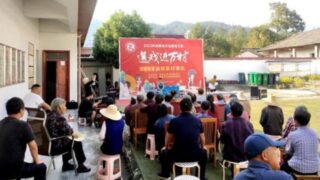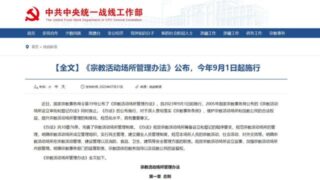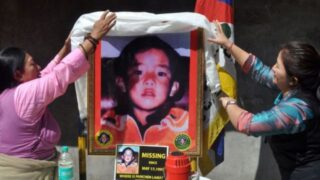Prizes and mandatory partaking for official helped the anti-xie jiao quiz slandering the banned religions to attract over 11 million users in just two weeks.
Chen Jinsheng
On March 20, the CCP launched a nationwide month-long knowledge quiz competition themed “boycott xie jiao and revere science.” Based on a popular gaming application Tounao Wangzhe (頭腦王者,literally “Mind King” or “Brain King”) on social messaging WeChat platform, the game offered a total of 100,000 RMB (about $ 15,000) in “red cash envelopes” and 10,000 gold coins – the virtual currency that can be deposited into users’ WeChat Pay accounts and used to make purchases – to attract people to participate in the competition.
According to CCP calculations, more than 800 million people in China use the internet; over 90 percent of these are mobile network users. Only half a month into the anti-xie jiao knowledge contest, the number of participants had exceeded 11 million. Although the month-long competition has already ended, the game still exists, and the number of people playing the game is increasing every day. The CCP has turned the mobile internet into one of the biggest platforms for suppressing religious belief.


A person who played the game said that it isn’t a contest of speed; rather, participants compete to see who has the largest reserve of anti-xie jiao knowledge. He added that every day, the initiator of this activity, Chinapeace.gov.cn – the official news website of the CCP Central Political and Legal Affairs Commission – uses its WeChat public account to issue various anti-xie jiao messages. If participants want to achieve a high score and pass to a more advanced stage of the game, they have to follow the website every day to acquire all kinds of so-called “anti-xie jiao knowledge.”
Some of the questions in the anti-xie jiao knowledge quiz:
Q: If you discover someone disseminating xie jiao promotional materials, what is the correct thing to do?
- Refuse to accept it and call the police
- Read the promotional materials
- Accept the promotional materials
- Neither pay attention nor ask about it.
Q: Can the government’s designation of a group as xie jiao organization be negated by a lawyer in a case?
- It can be negated
- There are no provisions regarding this issue
- It can be partially negated
- It cannot be negated.
As with “Xi Study Strong Nation,” the CCP has publicized and mandatorily promoted this game across all branches of government, as well as some enterprises and institutions. According to an internal document issued by the Anti-Xie Jiao Association of Liaoning Province in northeastern China, the authorities have promoted the anti-xie jiao game provincewide as an important task, and proactive initiatives to increase its impact have been included into performance assessments of local government officials.


Liaoning is not an isolated case. On April 2, a state-owned enterprise in eastern China’s Shandong Province held a staff meeting, demanding that all employees participate in the anti-xie jiao game. Specially assigned personnel monitored employees’ participation, and their number was to be reported to the superiors.
Some employees told Bitter Winter that they were not interested in the anti-xie jiao topic whatsoever and only participated in the game to avoid problems with their leaders. “The government is intentionally propagating the atheist notion that humans evolved from apes,” one employee commented on the game’s logo – an image of a half-ape, half-human face.
Religious groups that are not subject to government control or that the CCP believes are rapidly growing and pose a threat to the regime, such as Falun Gong, The Church of Almighty God, and the Shouters, are placed on a list of xie jiao and severely persecuted. To justify its actions, authorities misleadingly conflate xie jiao with those religious groups that in Western countries are maliciously called “cults.” The CCP treats opposition to xie jiao as a critical tool to safeguard national security and uses propaganda means to manipulate the minds of the people. This year, the CCP has launched many anti-xie jiao campaigns to mobilize the masses throughout the country, new methods emerging in an endless stream, like artistic performances and square dancing contests.
According to Dr. Raffaella Di Marzio, director of the Center for Studies on Freedom of Religion, Belief, and Conscience (LIREC) in Italy, the CCP is creating the image of religion as something dangerous. Through the CCP-prepared information on television and newspapers, the authorities are tainting the mentality of ordinary people that know nothing about religion; “They put the idea in their heads that religion is something that can harm the state, the people and one’s health, and that it can create war and violence” said Dr. Di Marzio in an interview. “The Chinese Communist Party is made to appear as if it wants to defend its citizens from this danger. There is a goal it wants to reach: showing that when religions are not under the control of the state, they are a danger to everyone.”















